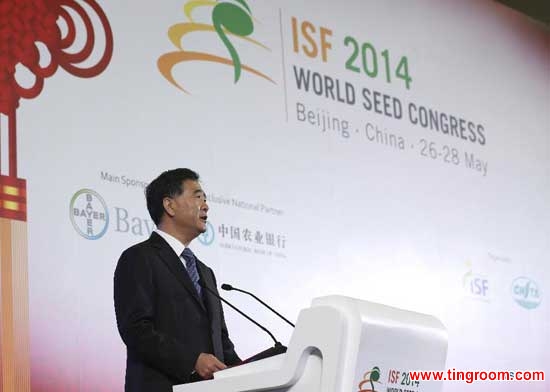China may surpass the US to become the world's largest seed market next year as commercialization in the seed industry accelerates, the Chinese Academy of Social Sciences said ahead of the start of the World Seed Congress in Beijing on Monday.
 Vice1 Premier2 Wang Yang addresses the opening ceremony of the 2014 World Seed Congress in Beijing, capital of China, May 26, 2014. (Xinhua/Ding Lin) " width="500" style="margin: 0px; padding: 0px; border: 0px none;" />
Vice1 Premier2 Wang Yang addresses the opening ceremony of the 2014 World Seed Congress in Beijing, capital of China, May 26, 2014. (Xinhua/Ding Lin) " width="500" style="margin: 0px; padding: 0px; border: 0px none;" />
Chinese Vice Premier Wang Yang addresses the opening ceremony of the 2014 World Seed Congress in Beijing, capital of China, May 26, 2014. (Xinhua/Ding Lin)
The World Seed Congress—a premier annual gathering3 where the industry comes to exchange ideas to better crop harvesting—is in China for the first time. Organizers say that this is an opportunity to tackle food safety, an issue closely related to people’s health and quality of life.
"Getting the right seed is a crucial part for agriculture production. As people’s life quality improves, they require better-tasting vegetables and fruits. With import and technology innovation, we have been upgrading our seeds in the past few decades," Beijing Agriculture Technology Extension Centre (BATEC) senior agronomist4 Zhang Lingjun said.
With China eager to better its food production, effort was made to upgrade seed yield, quality and expanding volume. On Sunday, the Chinese Academy of Social Sciences forecast that the country’s seed market volume would surge to US$14.2 billion next year, which would make it the number one seed market globally, and more stock would likely translate into large volumes of seeds for exports.
China has been working to boost its seed industry, feed its own population and to trade overseas. With international platforms like the World Seed Congress, it hopes to learn and exchange skills and knowledge to ensure its stock growth and better food quality.
As many in the industry increasingly gain new techniques from abroad, they quickly apply that knowledge to China’s specialties5.
"China enjoys a vast natural resource of edible6 mushrooms in the south, so it’s very easy to breed new seed varieties. Our technology in this area is quite advanced. So far China’s mushroom export accounts for more than 20 percent of the world total," BATEC senior agronomist Wu Shangjun said.
As the industry develops, the country still faces seed production challenges. In the past three years, authorities found nearly 20,000 cases of fake or low quality seeds. Experts say that insufficient7 innovation and loopholes in seed management still hamper8 the seed industry’s development.
 收听单词发音
收听单词发音 



